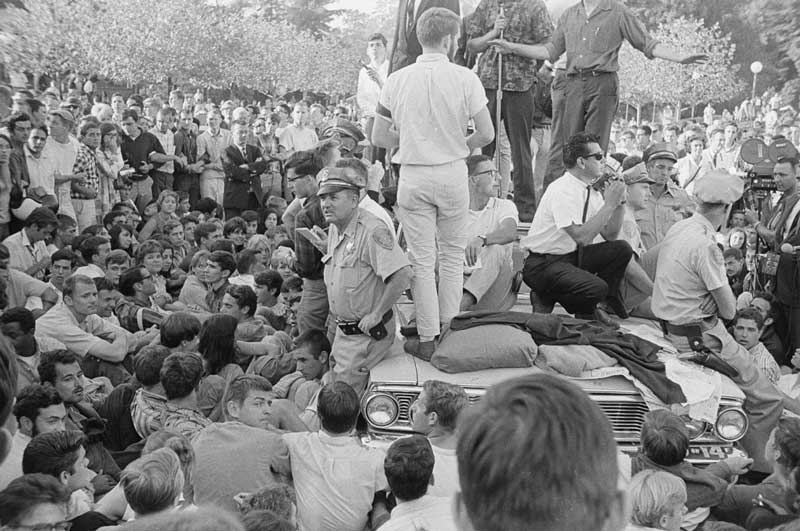Understanding Free Expression
Why does West Chester honor freedom of expression?
Here are some of the reasons why West Chester University is committed to protecting freedom of expression:
Students fought for the right to express themselves, without fear of punishment from their University.

Dixon vs. Alabama
The landmark case of Dixon vs. Alabama (1961) started when six black students were expelled from Alabama State College for participating in a sit-in at the Montgomery Courthouse. The courts struck down the college’s decision and reinstated the students, setting a critical legal precedent in which colleges must provide fairness and due process to students, and honor their freedom of expression.

Jack Weinberg and Berkeley Free Speech Movement
The University of California, Berkeley enforced rules preventing students from organizing and supporting political causes, which included preventing students from raising money and support for the civil rights movement. In 1964, student Jack Weinberg refused to show his identification to campus police while sitting at a table of the organization CORE (Congress Of Racial Equity). He was arrested and put into a police car. Eventually over 3000 students surrounded the car, and stood on the roof of the car as a speaker’s podium. The car remained in place for 32 hours, all with Jack Weinberg inside of it. Negotiations and continued protests ensued, which included a mass arrest of nearly 800 students and a strike by the faculty and staff. The movement won, and on December 14, 1964 the University declared that rules governing speech would not go beyond the first and fourteenth amendment.
We believe that top-down censorship of voices and viewpoints is not the answer.
- As an educational institution, we seek to empower students to confront disagreement through discourse, rather than silencing and excluding certain viewpoints.
- West Chester University, in its Statement of Mission and Goals, declares its commitment to educating graduates who will “engage inclusively in a diverse society” and “communicate effectively and participate in civic discourse.”
- Upholding the right of free expression (even when it is offensive or upsetting) is part of being an inclusive community. We encourage students who advocate for more limits on free speech on their campus to consider that this usually equates to tools being handed to those with power in a community (e.g. administrators or a majority), which are usually wielded against those lacking power and privilege in that community (e.g. those in the minority). Think about whether you would support the silencing of opinions you agree with, if those opinions were opposed by administrators, faculty, or a vocal majority of students at a fictional university.
- Though we resolutely support free expression, we also acknowledge that encountering views that feel hateful or targeting has a harmful impact, and that this impact may be more acute based on power and privilege differences. We believe that as a University we can honor free expression AND continually work towards being a more equitable and inclusive community. For information related to potential negative impacts of upsetting or objectionable expression on campus, click here.
We are required to uphold the rights afforded in the constitution.
“Congress shall make no law respecting an establishment of religion, or prohibiting the free exercise thereof; or abridging the freedom of speech, or of the press; or of the right of the people peaceably to assemble, and to petition the Government for a redress of grievances.”
- Colleges and Universities are prohibited from having rules or practices that restrict or even have a “chilling effect” on students’ free speech. While threats, harassment, and some other types of speech are not protected by the first amendment, in general colleges cannot prohibit even offensive or “hate speech”. Read more about what hate speech is.
- The University can and does have limits on the time, place, and manner of certain speech (for example it can’t disrupt classes in session), but these restrictions must be content and viewpoint neutral (meaning restrictions cannot be based on the views expressed, even if those views are offensive or objectionable). Read more on the Using Your Voice page.
- Because the University is a public institution, even non-students have the right to express themselves on campus. Read more on the Encountering Offensive Speech page.
